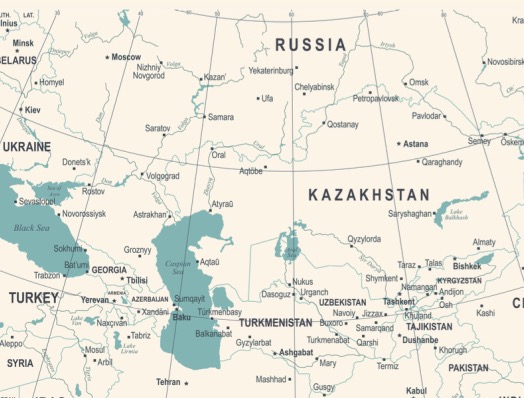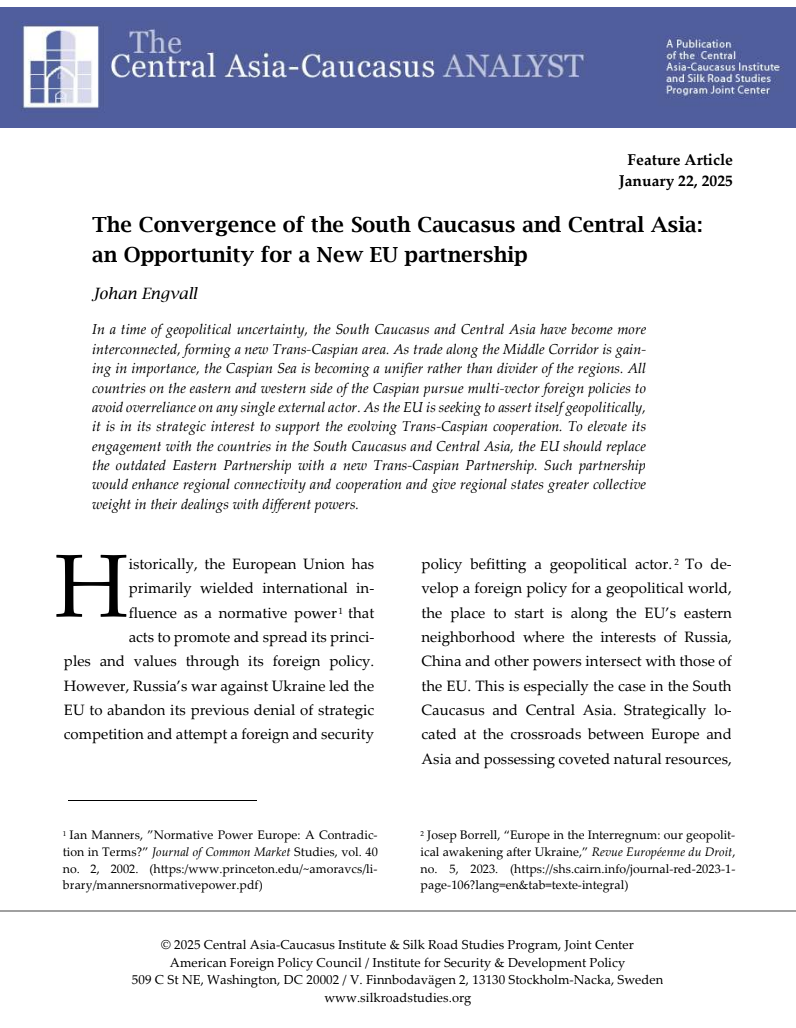The Convergence of the South Caucasus and Central Asia: an Opportunity for a New EU partnership
Johan Engvall
January 22, 2025
In a time of geopolitical uncertainty, the South Caucasus and Central Asia have become more interconnected, forming a new Trans-Caspian area. As trade along the Middle Corridor is gaining in importance, the Caspian Sea is becoming a unifier rather than divider of the regions. All countries on the eastern and western side of the Caspian pursue multi-vector foreign policies to avoid overreliance on any single external actor. As the EU is seeking to assert itself geopolitically, it is in its strategic interest to support the evolving Trans-Caspian cooperation. To elevate its engagement with the countries in the South Caucasus and Central Asia, the EU should replace the outdated Eastern Partnership with a new Trans-Caspian Partnership. Such partnership would enhance regional connectivity and cooperation and give regional states greater collective weight in their dealings with different powers.
Read The Convergence of the South Caucasus and Central Asia (PDF)
India, Pakistan, and the South Caucasus Arms Race
By Syed Fazl-e-Haider
Pakistan and India, the longstanding rivals in South Asia, have instigated an arms race in the South Caucasus region. This development comes amid a broader arms supply deficit caused by Russia's preoccupation with the ongoing conflict in Ukraine. While India is deepening its military partnership with Armenia, Pakistan is enhancing the defense capabilities of Azerbaijan. Both states are actively seeking to fill the vacuum in arms procurement left by Russia's reduced presence in the region. India has aligned with Armenia, leveraging this partnership to pursue strategic connectivity projects in the South Caucasus. Conversely, Pakistan views Azerbaijan as a strategic ally, with their collaboration deemed essential for countering India in the competition for regional influence.
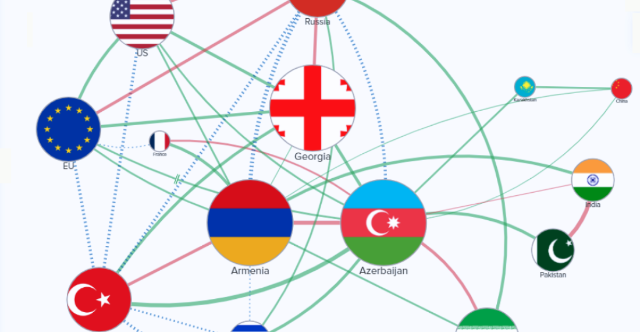
BCKGROUND: India and Pakistan have shared a contentious relationship since their emergence as independent states in 1947. The two states have engaged in three full-scale wars, primarily over Kashmir, a territory claimed by both. In 1998, Pakistan conducted nuclear tests shortly after India, marking a significant escalation in their rivalry. This ongoing antagonism often manifests in international forums, where the two countries accuse each other of fostering cross-border terrorism. Their rivalry extended to the South Caucasus in 2020, during the 44-day war between Armenia and Azerbaijan over the disputed Nagorno-Karabakh region.
Pakistan supported Azerbaijan during the Second Karabakh War in 2020. However, the close relationship between the two countries predates this conflict, with their cordial ties dating back to Azerbaijan's independence in 1991, following the dissolution of the Soviet Union. Pakistan was among the first nations to recognize Azerbaijan's independence, second only to Türkiye. After Armenian forces attacked Azerbaijan's Nagorno-Karabakh region shortly after its independence, both Türkiye and Pakistan strongly condemned Armenia's actions. Since then, they have consistently supported Azerbaijan’s position on the Nagorno-Karabakh issue in international forums, both politically and diplomatically. Pakistan has gone so far as to refrain from recognizing Armenia, refusing to establish diplomatic relations with the country. In return, Azerbaijan has endorsed Pakistan’s stance on the Kashmir dispute, a position that has antagonized India.
During the Second Karabakh War in 2020, Islamabad was alleged to have sent military advisers to support Azerbaijan. Armenian Prime Minister Nikol Pashinyan even claimed that Pakistani soldiers were actively fighting alongside the Azerbaijani army against Armenia during the 44-day conflict over Nagorno-Karabakh. Pakistan, however, categorically dismissed these allegations, labeling them as "baseless and unwarranted." Ultimately, Azerbaijan emerged victorious in the six-week war over the disputed region.
Türkiye strongly backed Pakistan's position on Kashmir, reciprocating Pakistan’s unequivocal support for Azerbaijan during the Karabakh war. The mutual endorsements of Islamabad's stance on Kashmir by Ankara and Baku provoked concern in New Delhi. Pakistan’s support for Azerbaijan during the conflict played a pivotal role in fostering closer ties between India and Armenia in the aftermath of the war. Observing its rival’s activities during the Karabakh conflict, India responded by significantly enhancing its defense partnership with Armenia over the subsequent four years.
Meanwhile, Azerbaijan, Pakistan, and Türkiye formalized their alliance by signing the Trilateral Islamabad Declaration in 2021, underscoring their solidarity with Azerbaijan in the aftermath of the war.
IMPLICATIONS: The supply of military equipment by India and Pakistan has significantly reduced Azerbaijan's and Armenia's dependence on Russia for weapons and ammunition. Historically, both South Caucasian nations relied heavily on Russia for defense supplies, particularly in the period preceding the 2020 Karabakh War. Between 2011 and 2020, Russia accounted for 94 percent of Armenia's major arms imports, including armored personnel carriers, air defense systems, multiple rocket launchers, and tanks. Similarly, Azerbaijan depended extensively on Russian military supplies during the same period, purchasing armored vehicles, air defense systems, Smerch rockets, transport and combat helicopters, artillery, multiple rocket launchers, and tanks.
India considers Armenia a strategic partner in the South Caucasus and has consequently deepened its military ties with Yerevan. Armenia has emerged as the largest foreign recipient of Indian weapons, with defense contracts concluded since 2020 estimated at US$ 2 billion. According to a report by the Indian Ministry of Finance, Armenia has become the leading importer of Indian arms, securing deals for the purchase of Pinaka multiple-launch rocket systems and Akash anti-aircraft systems. This development reflects a significant realignment in the defense landscape of the region.
In September, Azerbaijan formally introduced Pakistan’s fourth-generation JF-17 Thunder Block III fighter jets to its air force, marking a significant milestone in defense cooperation between the two nations. This development followed a US$ 1.6 billion agreement signed in February for the acquisition of JF-17 Block III aircraft. The deal includes not only the supply of aircraft but also ammunition and pilot training provided by Pakistan. The advanced combat capabilities of the JF-17 Block III are expected to enhance Azerbaijan's military edge in the South Caucasus. Notably, Azerbaijan has requested 60 JF-17 jets, intended to replace its entire fleet of aircraft, making this the largest defense export deal in Pakistan’s history.
The defense agreements between India and Armenia, as well as those between Pakistan and Azerbaijan, have significantly diminished Russia’s position as the principal supplier of weapons and ammunition to the South Caucasian nations. This shift has been exacerbated by Russia’s ongoing war in Ukraine, which has undermined its ability to deliver weapons in a timely manner under previously signed contracts. The entry of India and Pakistan into the regional defense market has provided Armenia and Azerbaijan with an opportunity to diversify their military procurement, reducing their historical reliance on Russian defense supplies.
The entry of India and Pakistan into the South Caucasus has resulted in the formation of two rival blocs competing for regional influence. One alliance, referred to as the Three Brothers, comprises Azerbaijan, Türkiye, and Pakistan, while the opposing group includes Armenia, Iran, France, and India.
For India, Armenia holds strategic importance as a potential bridge to access the vast market of the Eurasian Economic Union (EAEU). New Delhi views Armenia as a vital transit hub for connecting Indian goods to EU countries and envisions its role in facilitating bilateral or multilateral partnerships with nations such as Iran, France, and Greece to implement strategic connectivity projects in the South Caucasus.
Conversely, Islamabad considers its partnership with Azerbaijan critical for countering India's influence in the region. Azerbaijan has also emerged as a key player in the energy transit corridors connecting the Black Sea, South Caucasus, and Europe, further enhancing its geopolitical significance. This dynamic positions Azerbaijan as a strategic ally for Pakistan, particularly in the context of their shared interests in limiting India's regional ambitions.
CONCLUSIONS: Pakistan's defense cooperation with Azerbaijan and India's arms sales to Armenia are shaping new security dynamics that link the South Caucasus and South Asia. The extensive defense contracts between India and Armenia are poised to strengthen Armenia's position as a strategic ally for India in the region.
India's military partnership with Armenia is influenced by its geopolitical rivalry with Pakistan, which is actively supporting Azerbaijan's defense capabilities. Both Pakistan and India aim to secure reciprocal cooperation from the South Caucasian nations to advance their strategic interests. For Pakistan, Azerbaijan holds particular importance as a potential partner in trans-regional energy cooperation, given Pakistan's energy deficiencies. Azerbaijan's pivotal role in the energy transit corridor connecting South Asia and the South Caucasus further underscores this strategic alignment.
Conversely, India, as an observer in the Eurasian Economic Union (EAEU), is working to deepen its cooperation with Armenia across economic sectors, with a particular emphasis on defense. Armenia's strategic position could also facilitate India's broader connectivity initiatives with Europe. Meanwhile, Pakistan is likely to leverage its relationship with Azerbaijan to counterbalance India's growing influence in the region, highlighting the interconnected and competitive geopolitical landscape of the South Caucasus and South Asia.
AUTHOR’S BIO: Syed Fazl-e-Haider is a Karachi-based analyst of the Wikistrat. He is a freelance columnist and the author of several books. He has contributed articles and analysis to a range of publications. He is a regular contributor to Eurasia Daily Monitor of Jamestown Foundation.
India-Pakistan Strategic Rivalry Extends to the South Caucasus
By Vali Kaleji
March 28, 2024
The development of military and defense relations between Azerbaijan and Pakistan and Armenia and India is an important consequence of the political arrangement and the balance of forces after the Second Karabakh War. However, Pakistan’s non-recognition of Israel has prevented Baku from forming a “quadruple alliance” with its three strategic allies, including Turkey, Israel and Pakistan. Armenia, after defeat in the war and amid dissatisfaction with its traditional ally Russia and the Collective Security Treaty Organization (CSTO), views India, France and Iran as new strategic options, however, Iran prefers Armenia to maintain its traditional and strategic relations with Russia. The tripartite cooperation between Armenia, Iran and India focus efforts on “soft balancing” (economic-transit) instead of “hard balancing” (military-security), against the tripartite ties of Azerbaijan, Turkey and Pakistan in the South Caucasus.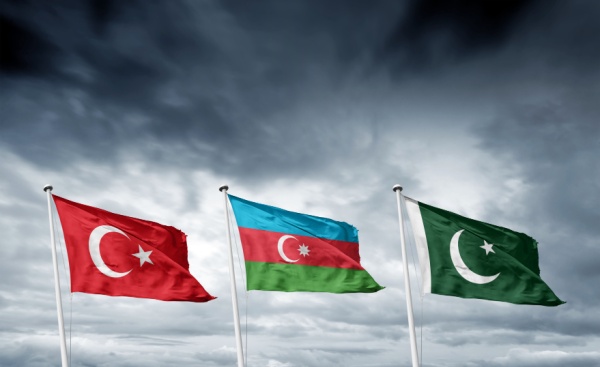
Pashinyan Between Armenia and Azerbaijan: The Curse of Radical Changes
By Mehmet Fatih Oztarsu
February 27, 2024
Armenian Prime Minister Nikol Pashinyan seeks a new path forward following Azerbaijan’s seizure of Nagorno-Karabakh and the radical shift in regional dynamics in the South Caucasus. His initiatives aim to revitalize Armenia and resolve longstanding issues, forging a new regional posture. However, domestic divisions and external challenges complicate his efforts. Azerbaijan has not responded to his calls for alternative cooperation while he remains skeptical of Azerbaijan’s overtures. Therefore, Pashinyan prefers to deal with Armenia’s domestic priorities and move carefully towards regional cooperation.
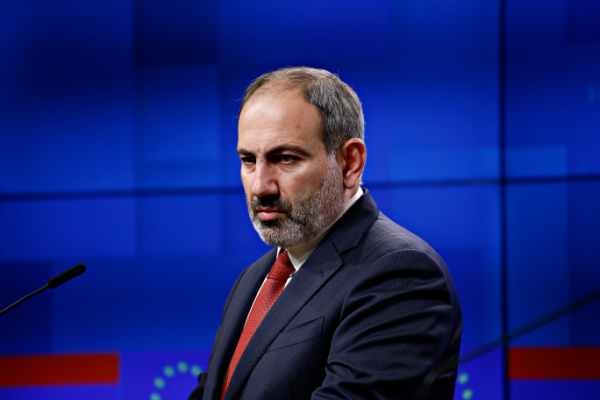
Russia's Weakened Influence in Central Asia and the Caucasus
By Alexander Yeo and Emil Souleimanov
July 6, 2023
Russia has long been a regional hegemon, able to actively exert hard and soft power over many of its neighbors, the Central Asian and South Caucasian states among them. However, since the start of Russia’s full-scale invasion of Ukraine, this influence has weakened, with military and economic resources being diverted to an increasingly protracted and unpredictable war effort. This has led to a shift in regional power balances, as showcased by Azerbaijan’s ascendancy in the South Caucasus, as well as economic challenges including the difficult choices faced by the allies of an increasingly isolated Russia.
